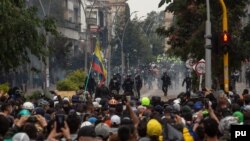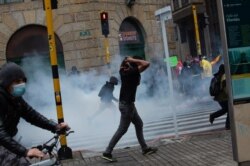Tens of thousands of protesters across Colombia took to the streets Wednesday in a nationwide strike that ended in violent clashes between riot police and demonstrators.
The protests came at a time of soaring COVID infection rates in the South American country, where a third wave of the virus has threatened to overwhelm hospital intensive care units.
Despite a court order to postpone the strike over concerns of the potential consequences on health systems, masses filled the streets of some of Colombia’s major cities.
The strike, known as the Paro Nacional, was a reaction to proposed tax hikes by the administration of embattled Colombian President Iván Duque, but the marches soon became a backlash to tensions and economic turmoil caused by the pandemic.
Alicia Prieto, 59, walked among those crowds touting a surgical mask and a sign reading “the power of the people is growing.”
“We’re more scared to stay at home and go hungry than of the pandemic, Prieto said. “We’re not scared of the pandemic anymore, we’re scared of the government.”
More than 2.8 million cases of the virus have been reported and 72,000 people have died from the virus in the country of 50 million people.
The widely unpopular tax reform would add a 19% tax on things like Internet service, gasoline, electricity, water, among other things, and impose income taxes on people who earn more than $700 a month.
The money raised would go toward covering deficits caused by the pandemic, and providing small cash payments to households living in poverty and extreme poverty.
Critics like Prieto are quick to say that at a time of surging poverty and when workers have been crippled by government-imposed lockdowns, corporations are the ones who should take on the brunt of the taxes instead of citizens. Small payments do little to tackle the depth of the crisis, she said.
“We are already struggling to make ends meet. We’ve already been affected,” Prieto, a member of the middle class, said. “They keep us in our homes, but we don’t know how to economically survive. I’m talking about people like us in the middle class. Poorer people simply go hungry.”
The pandemic has generated rising inequalities and poverty rates across the world. Though for Latin America, a region already grappling with such problems before the pandemic, the fallout has been devastating.
Colombia saw its economy shrink an estimated 7% last year.
Sergio Guzmán, director of Colombia Risk Analysis, said the protest was less about one specific policy and more about a general feeling of inequality that has permeated the country, especially since the onset of the pandemic.
“I think there’s a lot of frustration. There’s been a year of lockdowns, a year of COVID,” Guzmán said. “People are fed up, people are tired. People need outlets to vent their frustration and outrage about the status quo.”
Instability threat
Others, like 26-year-old Lorena Vasquez, came out to call against a surge of violence in Colombia. She and other protesters place the blame on right-wing Duque’s failures to follow through on key promises in Colombia’s peace pact with guerrillas of the Revolutionary Armed Forces of Colombia, FARC.
The 2016 peace accords ended more than a half century of war with the rebel group, and offered the nation a chance at peace. But power vacuums left by the government and failures to implement the accords have led to a surge of violence in large swathes of the country as rivaling armed groups fight for power.
Massacres and targeted assassinations of human rights defenders and social leaders –people who often challenge the power of armed groups – have also risen across the country during the pandemic.
“The number of social leaders being killed goes up every day, and they don’t do anything,” Vasquez said. “What they do is keep quiet about the reality that we’re living through: a huge massacre in our country.”
Similar violence was what spurred on months of protest during the country’s first Paro Nacional in 2019.
Clashes
As protests wound on Wednesday, violent clashes between police and protesters broke out in Bogotá, Cali and other major cities. Tear gas hovered over much of downtown Bogotá Wednesday night.
In the country’s third biggest city of Cali, public buses were burnt, and across the country windows were shattered, with reports saying rioters had broken into into stores and banks. In Bogotá, local officials reported that vandalism left 11% of the city’s transport system affected or in disrepair.
By early Thursday, police and protesters reported nearly a hundred injured between officers and civilians, and officials confirmed that at least two protesters died during demonstrations.
Organizers vowed to continue the protests.
Duque responded to the strike, refusing to withdraw the proposal from Colombia’s Congress, but saying he hopes to open dialogues with protest leaders.
“With us listening to everyone’s positions, we can find a solution and set goals,” the president said Wednesday night.
While Guzmán said he thinks protests will continue to stretch on, fueled by festering discontent in the Latin American nation, he also said he doubts marches will end in any significant change.
Meanwhile, 29-year-old Vasquez continued to hold onto hope that the marches would spark change.
“I hope they hear us, I hope there’s no attacks or injuries,” she said as protesters milled by her. “And more than anything, I hope there’s justice in Colombia,” she said.






